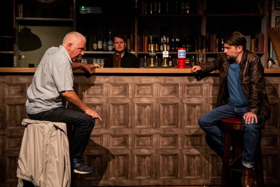Review: QUIETLY, Omnibus Theatre

![]() No man - if he's honest, and many are not - can look back at their testosterone-fuelled teenage years without wondering, "What if I'd paid a full price for all that foolishness?" Everyone makes mistakes - what determines the consequences is the combination of environment and luck that continues to shape our lives, but never quite to the same extent, the risks never quite so great, the mind never quite as addled by hormones. Many men might wish to be (as the Buzzcocks once sang) "Sixteen Again" but only if we can have the perspective acquired over the decades since.
No man - if he's honest, and many are not - can look back at their testosterone-fuelled teenage years without wondering, "What if I'd paid a full price for all that foolishness?" Everyone makes mistakes - what determines the consequences is the combination of environment and luck that continues to shape our lives, but never quite to the same extent, the risks never quite so great, the mind never quite as addled by hormones. Many men might wish to be (as the Buzzcocks once sang) "Sixteen Again" but only if we can have the perspective acquired over the decades since.
The tragic mismatch of bravado and judgement lie at the heart of Owen McCafferty's electrifying (almost) two-hander, Quietly. Jimmy hobbles into a bar and warns the Polish barman Robert (Belfast has immigrants in the 21st century having not attracted many in the 20th) that a man will meet him and things might get difficult, but that it's nothing to do with him.
Ian walks in and is greeted with violence, to which he does not respond, and the men sit and talk. Jimmy is a (lapsed) Catholic and Ian a Protestant: 36 years ago, long before the Good Friday Agreement brought a cessation to The Troubles (a guerrilla civil war that raged in the UK for decades), their lives had previously crossed in violence, that time with far-reaching consequences, destined to remain unresolved.
The men are 52 years old now, and both recognise that the lads who screamed "Fenian Bastards" and "Orange Bastards" at each other from crowds filled with kids just like them, are not the men they are now. They sit and talk, telling their own stories that start at such divergent points, but narrow and narrow into the focus that brings them to that same bar that saw such carnage in 1974. It's not Freud's talking cure for their pain, but it helps - Truth, if not quite Reconciliation.
Performed in the theatre bar, a tension felt palpable in the air. To many of us this was not dusty history, but barely faded memory, the dull thud of the Bishopsgate bomb for me as I stood in a telephone box near Bank tube station or the indelible front page images of the Birmingham pub bombings, also from 1974. No Brit (and certainly no Irish man or woman) of 50 years or more, will not feel something bubble to the surface, triggered by this ancient enmity laid out in full view.
Paul Lloyd gives us a Jimmy hobbled by broken legs and a broken heart, but whose intelligence and self-knowledge washes over his deep-seated (and justified) resentment, his emotions not so much suppressed, but more balanced, time having wrought its work. Nick Danan, stiller - though not always - is seeking redemption of some kind, but not the absolution of the Roman faith. Both performances are frighteningly plausible.
But it's McCafferty's words that reached into the hearts and minds of the audience, and, even if most of the banter with the barman (Matt Dunphy) was a little unnecessary, it's a price worth paying for the conversation between the two antagonists. The 70 minutes production is simply, but brilliantly, directed by James O'Donnell in the bar at which we were standing just moments earlier, a reminder of how The Troubles would transform familiar spaces.
As the Irish Problem (really, it's a British Problem) finds a voice yet again, this time in the context of Brexit, Quietly is a reminder that the hard won absence of violence that followed the Good Friday Agreement was not the result of issues being resolved (well, not many) but of men growing old and looking back at their youth and not wanting their sons to fall into the same temptations. Those men will die soon (many have already) and the lessons learned may well go with them.
What will the 16 year-olds born today do when the blood is up and romantic tales of liberation and heroism are whispered into their ears?
Quietly continues at the Omnibus Theatre until 27 October.
Photo by Stephanie Claire
Reader Reviews
Videos

